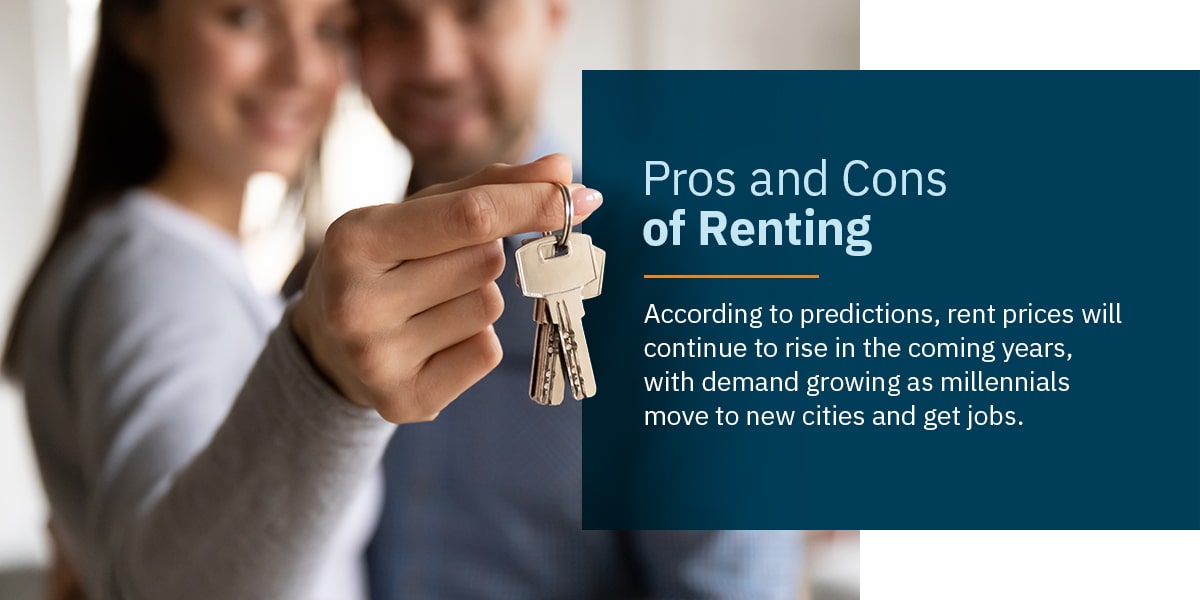Should You Buy or Rent Your Next House?
Whether you’re moving out of your parent’s home for the first time or looking to relocate you’re likely considering whether you should rent or buy your next house. Many different factors will influence your decision, including:
- Budget
- Family size
- Pets
- Location
- Preferences
It can be tough to consider whether it is better to rent or buy, especially with the housing and rental markets fluctuating yearly. Read this guide on the pros and cons of renting versus buying.
Pros and Cons of Buying a House
When buying a house, market conditions will play a role in your decision-making process. Market predictors indicate that mortgage rates will likely rise into 2022, but the current supply shortage will get a slight reprieve as more owners put their homes on the market.
If you are looking for homes during a market that favors buyers, called a buyer’s market, you will find plenty of supply and likely be able to buy a home at a price lower than asking. However, if you’re looking during a market that favors sellers, also known as a seller’s market, you might have more trouble finding a house and will likely have to place more competitive offers to outbid other buyers.
No matter when you plan to buy a house, there are various pros and cons of buying and owning a home:
Pros of Buying a House
Buying a home can offer these advantages:
- Stability: When you have a home, you know you’ll have a place to live year after year — as long as you keep up with payments. You won’t need to worry about renewing lease terms or possibly not being able to renew the lease at all.
- Community belonging: Having a home can help you build connections with your community, including neighbors and local businesses.
- Building equity: As you pay your mortgage, you can build equity, which you can use on large expenses, such as home renovations, or cash out once you sell your home.
- Design freedom: When you own a home, you get the final say in all design decisions — you can paint a room or even tear down a wall if you have the impulse.
Cons of Buying a House
Potential drawbacks of owning your own home include:
- Monthly costs: You have to pay a lot more than the mortgage when you own a home. You’ll be responsible for insurance, property taxes — which can be high in certain areas — and all utilities, including water, sewer, power, heat, and wireless internet.
- Maintenance: You’ll be responsible for all maintenance when you own a home. You’ll need to take care of or hire someone for lawn and interior maintenance and damage from pests and harsh weather.
- Less flexibility: If you live an adventurous lifestyle, owning a house might mean less flexibility to get up and go. In addition to being a more permanent living situation, you might have responsibilities to maintain your yard and home according to the standards of the homeowner’s association.
Pros and Cons of Renting
Finding a good rental market largely depends on location — you’ll have more options in larger cities, while smaller cities and towns won’t present as many good rental options. According to predictions, rent prices will continue to rise in the coming years, with demand growing as millennials move to new cities and get jobs.
Pros of Renting
Renting can be an excellent option for anyone starting out living on their own, or for those in transitional stages, such as:
- Moving to a new city
- Getting a new job
- Recently married couples
- Retirees looking to travel more
- Professionals who travel for work
Renting provides great flexibility and can help people budget — during a lease term, rent will stay the same, and utilities, if the landlord doesn’t cover them, generally remain within a predictable range. You can also save money if you rent a place within a community that offers amenities like fitness equipment, pools, laundry, and free Wi-Fi.
Renting is also lower maintenance, as renters are not responsible for most upkeep and significant maintenance issues like pest control and repairs. If you enjoy the flexibility of different living spaces or even the ability to move to other areas and cities, renting might be for you.
Cons of Renting
While some enjoy the flexibilities of renting, there are some potential cons involved:
- Unpredictable rent increases
- Larger monthly payments
- No freedom to customize your home design
- Less stability
- Possible refusal to renew lease terms
Should You Buy or Rent When Interest Rates Are Rising?
Mortgage interest rates are currently trending upward, and many potential homebuyers have been priced out of purchasing or scared out of the market. As CRPC® Cory J. Phillips explained in a CNBC article, “The last couple years we, as consumers, got used to such a low rate. Now it’s our expectation.” As one of Fort Pitt Capital Group’s financial advisors, Phillips shares his passion for financial planning by offering advice on wealth preservation, retirement planning and navigating life’s biggest transitions.
Rising interest rates haven’t only increased mortgage prices — recent years have also seen significant increases in rental rates as landlords try to make up their losses. Still, with the upfront costs required to buy a home, it may make sense to delay your purchase for a couple of years to save more money and find the home of your dreams.
Ultimately, whether you should buy or rent your next home can depend on several factors. Phillips emphasizes looking at the big picture — interest rates, while important, should not be a key determiner in when you purchase a house. If the time is right for you to buy, don’t play into attempting to time the rate market, as you could end up in an even more perilous position. Other considerations should include:
- How long you’ll live there: As you shop for homes, consider how long you will stay there. If you’re planning on moving in the next five or six years, you may not live there long enough to do much more than break even on a home sale, so renting would be a better option. Conversely, if you want to put down roots and stay where you are for the foreseeable future, buying a home will eventually cost less than paying rent.
- Your home purchase history: Those looking to become first-time homebuyers should be especially wary about making their home purchase. Despite rising interest rates, the housing market is currently at a peak. While it may seem like a good time to invest, remember that market crashes can come at any time, resulting in a loss of capital.
- Your financial situation: Renting is a commitment for as long as you live in that home. However, the pros of renting include lowering your upfront costs and eliminating the risk of losing your investment if the market takes a turn. Furthermore, you’re likely to come across unanticipated expenses when buying a house, so take that into account when deciding whether you can afford a down payment.
5 Questions to Consider in Your Decision
If your decision is not clear, there are a few questions you can ask yourself to determine which option works well for you. These questions include:
- How long do you plan to live there? If you’re starting out in a new city or aren’t sure about your future plans, renting could be a good option. On the other hand, if you want to stay in one place, look into buying your home.
- What’s the cost of buying versus renting? Both options have different price breakdowns, but depending on the area you’re looking into, one option might come out as more cost-effective than the other.
- Do you value mobility or want to put down some roots? If you’re a lover of travel and adventure, you may not want the responsibilities associated with homeownership. However, if you want to start a family and build a community, you’ll benefit from having a stable home you can live in as long as you like.
- What are the risks of buying and renting? Another important consideration is whether you are prepared to assume the risks of each option. Purchasing a home is an immense investment, and you risk quite a bit when undertaking that option. On the other hand, renting may make you vulnerable to finding new living accommodations sooner than you would like.
- Does your decision fit with your financial goals? Consider your current financial situation and where you’d like to be in five or ten years. If your credit isn’t where you’d like it to be, renting for a while can help you save money and build up credit, meaning you could get lower interest rates when you decide to buy. On the other hand, if you have a good financial situation, buying a house can help you save for long-term goals, like retirement.
Reach Your Financial Goals With Fort Pitt Capital Group
When you’re planning for any significant financial move, including buying a home or investing in a rental property, you want to make sure your decisions align with your financial goals. With the help of the in-house financial advisors at Fort Pitt Capital Group, you can learn about your options and get a better picture of your financial readiness to buy or rent a home.
We offer many financial services, including personal financial advising for individuals and couples looking into buying or refinancing their homes. Get in touch today and learn how our advisors can help you reach your financial goals.






